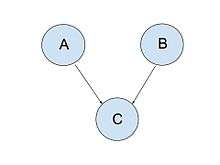Conditional dependence

In probability theory, conditional dependence is a relationship between two or more events that are dependent when a third event occurs.[1][2] For example, if A and B are two events that individually affect the happening of a third event C, and do not directly affect each other, then initially (when the event C has not occurred)
Eventually the event C occurs, and now if event A occurs the probability of occurrence of the event B will decrease (similarly event B occurring first will decrease the probability of occurrence of A in future). Hence, now the two events A and B become conditionally dependent because their probability of occurrence is dependent on either event's occurrence. Intuitively we can say that since A and B both were probable causes of C, given C has occurred, occurrence of either of A or B alone could explain away the happening of C.
In essence probability comes from a person's information content about occurrence of an event. For example, let the event A be 'I have a new car'; event B be 'I have a new watch'; and event C be 'I am happy'. Let us assume that the event C has occurred – meaning 'I am happy'. Now if a third person sees my new watch, he/she will attribute this reason to my happiness. Thus in his/her view the probability of the event A ('I have a new car') to have been the cause of the event C ('I am happy') will decrease as the event C has been explained away by the event B.
Conditional dependence is different from conditional independence. In conditional independence two events (which may be dependent or not) become independent given the occurrence of a third event.[6]
See also
References
- ↑ Introduction to Artificial Intelligence by Sebastian Thrun and Peter Norvig, 2011 "Unit 3: Conditional Dependence"
- ↑ Introduction to learning Bayesian Networks from Data by Dirk Husmeier "Introduction to Learning Bayesian Networks from Data -Dirk Husmeier"
- ↑ Conditional Independence in Statistical theory "Conditional Independence in Statistical Theory", A. P. Dawid"
- ↑ Probabilistic independence on Britannica "Probability->Applications of conditional probability->independence (equation 7) "
- ↑ Introduction to Artificial Intelligence by Sebastian Thrun and Peter Norvig, 2011 "Unit 3: Explaining Away"
- ↑ Conditional Independence in Statistical theory "Conditional Independence in Statistical Theory", A. P. Dawid